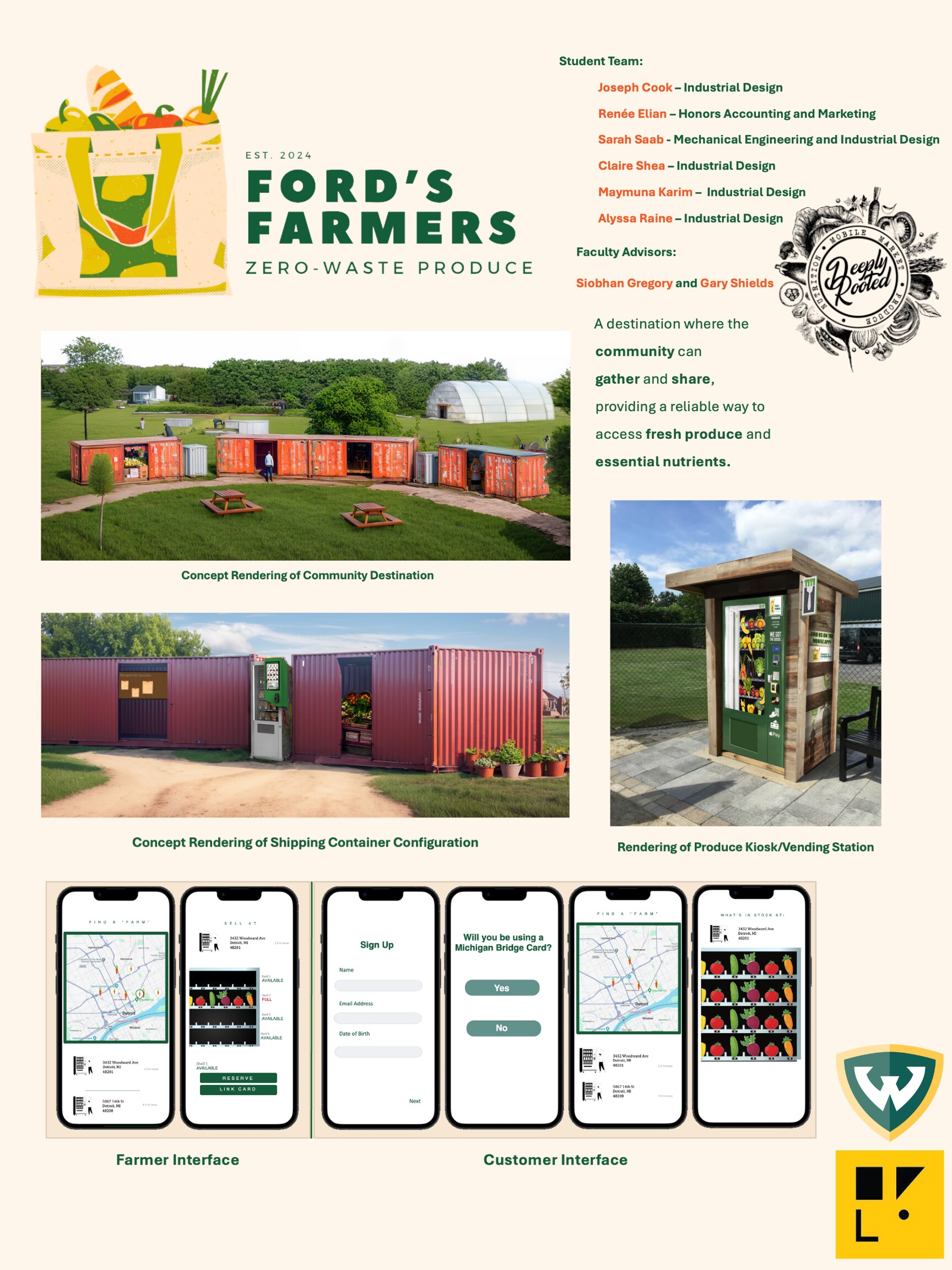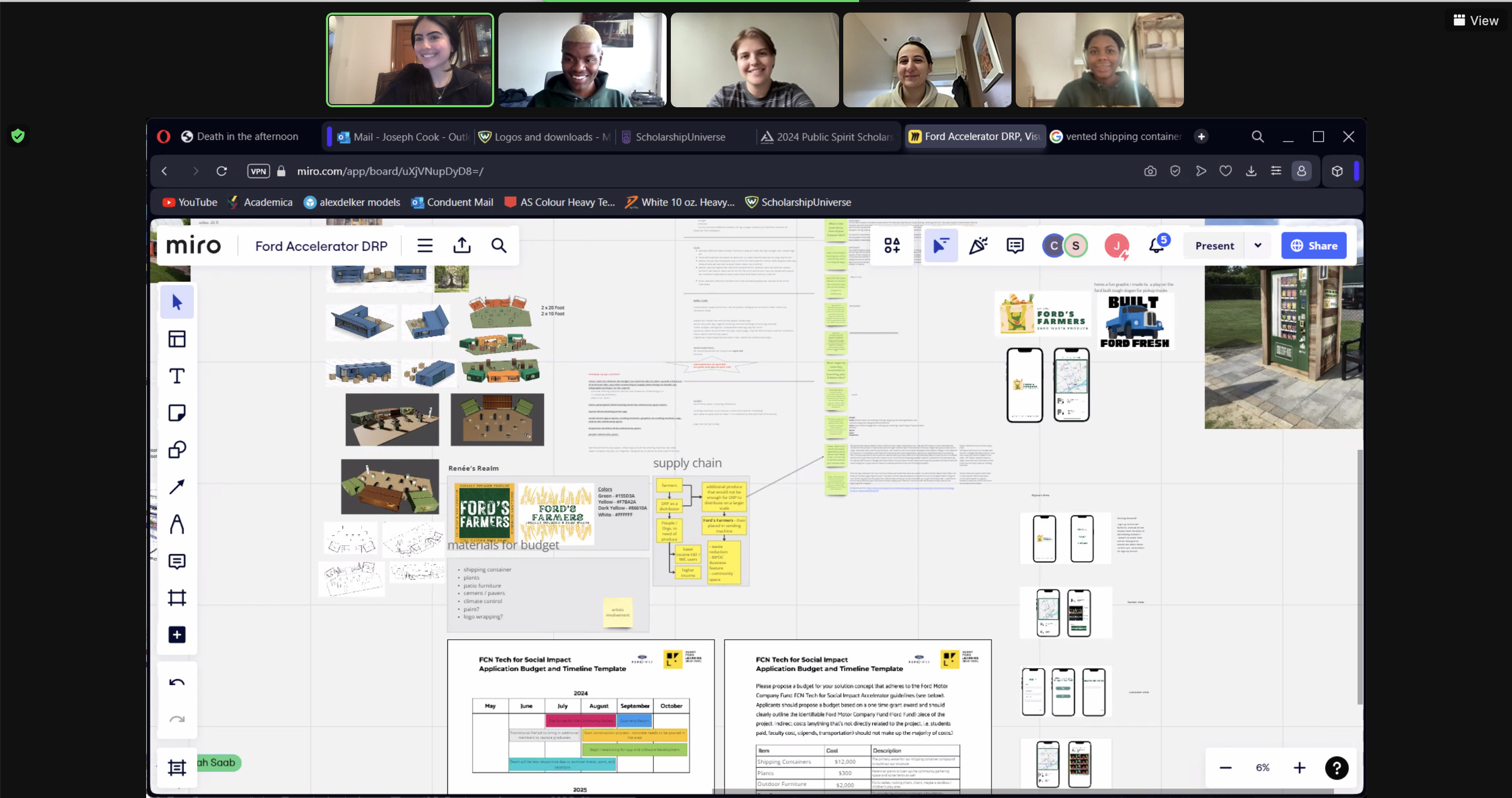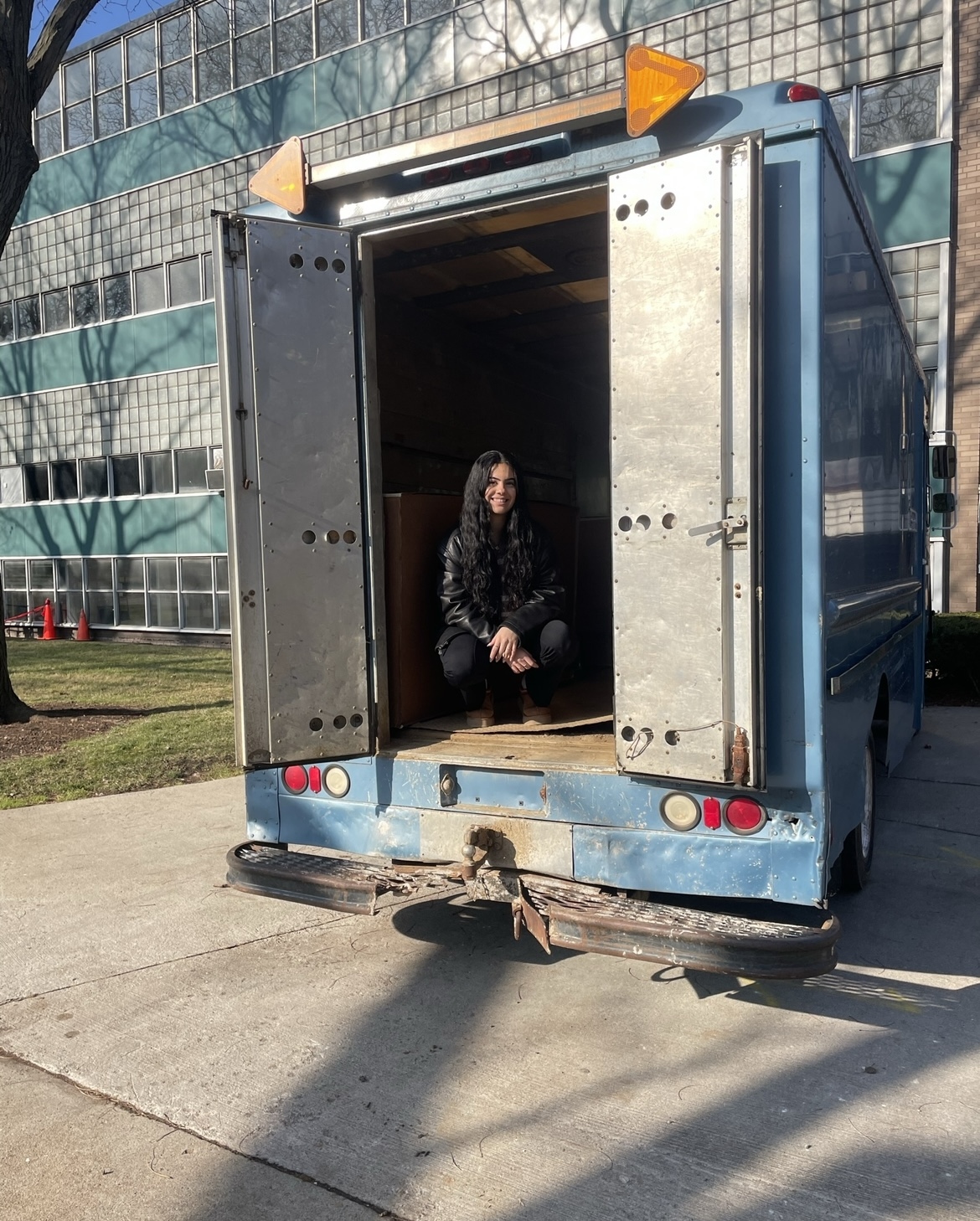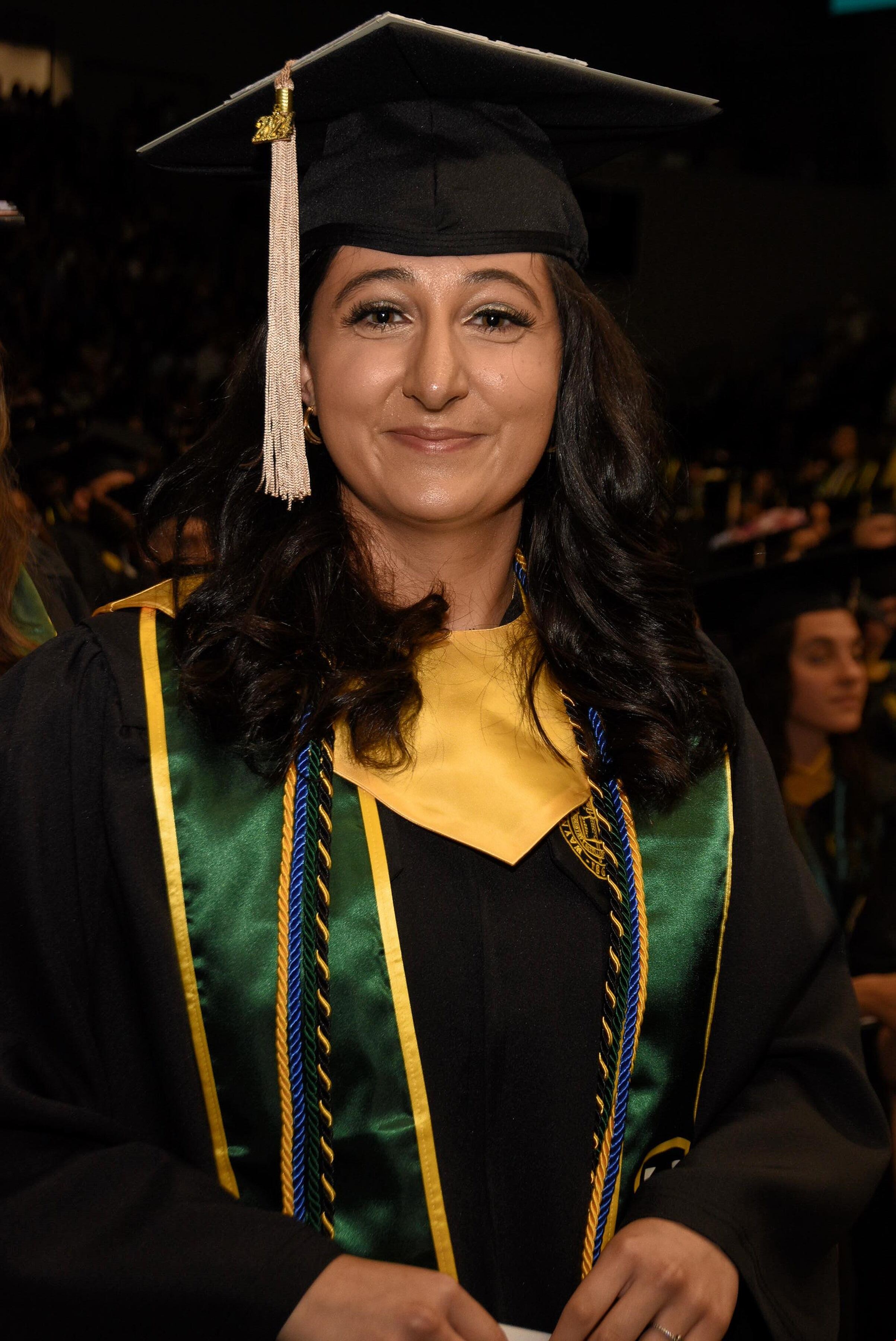Interdisciplinary collaboration and innovation from a team of WSU students earn a $20,000 grant from Ford Technology for Social Impact Accelerator
Wayne State students, including Ilitch School of Business student Renee Elian, recently partnered together to compete in the "Ford Technology for Social Impact Accelerator" for grants to develop innovations to expand local organization services.
The WSU team competed against sixteen other universities and secured a $20,000 grant for their Detroit-based partner organization Deeply Rooted Produce, to help them further their mission to increase access to locally grown foods.
Their winning proposal was to create a community space destination using shipping containers as a cost-effective building material, where small-scale growers can sell their products easily and conveniently, giving more flexibility to shoppers.
The key feature for the space is feature fresh produce vending machines, a project that Deeply Rooted Produce had been working on for some time, that would allow farmers to vend their produce passively, and receive direct payments for the products vended.
Beginning the project

Elian first came to the Mike Ilitch School of Business to pursue honors accounting and marketing studies, while staying close to her loved ones.
"I am very close with my family. I'm also a first-generation college student and American," said Elian. She first became involved in this project when Associate Professor of Teaching Gary Shields reached out to her. She knew this was an opportunity she could not miss.
"He contacted me based on a referral from one of my marketing professors, and asked if I would be interested in participating in the program," said Elian. "I've always been passionate about the city of Detroit, and the issues that are facing the city like food insecurity and transportation, so I knew I wanted to participate."
Shields was excited to get Ilitch School students involved in this project. He was first introduced to this project through Sean Schroeder, Corporate Engagement Officer for the Mike Ilitch School of Business, who maintains connections with Ford Philanthropy.
"The design thinking process is a valuable skill set they will be able to use throughout their careers and lives, no matter what career path they take," said Shields. "I hope that the nature of the challenge-direct application of the process and their ideas-can positively impact the community."
Ilitch School Dean Virginia Kleist was equally thrilled about the award and the ongoing partnership.
"I am immensely proud that an Ilitch School student had the opportunity to participate in this impactful program and collaborate with such a dedicated organization, one that is deeply committed to making a significant impact on our city and fostering the urban health of our community," said Kleist. "Congratulations to everyone who took part in this program and to those who supported the WSU team as they pursued this exceptional opportunity."
Students participating in the program created and pitched their project to the Ford Motor Company Fund, while completing a certification in design thinking through the Henry Ford Learning Institute. Through this course, students became familiar with design thinking tools and methods, and learned to design projects that would have a positive social and economic impact on their communities.

Henry Ford Learning Institute
Elian worked with design students from the College of Fine, Performing and Communication Arts. Joseph Cook, Alyssa Raine, Claire Shea, Maymuna Khan and Sarah Saab all contributed their design expertise to this pitch.
Saab, who is pursuing a degree in mechanical engineering with a minor in industrial design, found the training and her partnership with Elian and the other students in the program to be insightful.
"Being a design student with an engineering-heavy background, the sessions with Henry Ford have been incredibly beneficial and helpful," explained Saab. "It's very different when you're designing things for actual use by the community and not just in school for a grade, without an end user."
Deeply Rooted Produce
Dazmonique Carr, founder and Director of Operations at Deeply Rooted Produce, came to Detroit from New Jersey when she was recruited to Wayne State's track and field team. She earned an undergraduate degree in Kinesiology Exercise Sports Science, and a graduate degree in Sports Administration, focusing on community health programming from the College of Education. Carr founded Deeply Rooted Produce after graduating three years ago.

that was rebuilt to deliver produce
"We are a zero-waste mobile grocery store, helping to increase access to locally grown foods," explained Carr. "We also run Deeply Rooted Gardens, a non-profit that helps bridge the gap between farmers and their ability to get their produce to a distributor to serve more customers."
Carr delivers produce subscription boxes through a partnership with the Michigan Fitness Foundation, who help subsidize the cost to customers. Deeply Rooted Produce also owns and grows produce on an acre and a half farm on Detroit's east side. They collaborate with other local farmers to meet the produce demands of their customers.
WSU Associate Professor of Design Siobhan Gregory, who worked with the students on their pitches and designs, has helped to support this organization's development for a long time.
"My students and I were already working with Dazmonique and it was a perfect fit, fulfilling the community partnership intention for the contest," said Gregory. "We had a strong relationship with DRP that we had been developing for a few years, with other cohorts of students and having been awarded three rounds of funding from the WSU Mobility for All Challenge. This was a great next step."
Pitching the project
The project the WSU team pitched to the Henry Ford Learning Institute was one that Carr had wanted to pursue. Elian, Saab and their team members were able to create the designs and plans necessary to make it a reality.
"We formed the idea to use shipping containers as a community gathering space and a grocery store for local farmers to come and stock produce," explained Elian. "Kind of like Eastern Market, but easier for local farmers to participate and stock produce."

A prominent feature of this space will be fresh produce vending machines, which will allow farmers to passively vend their produce and receive direct payment through a mobile app. Carr was glad to see that this aspect of her dream for Deeply Rooted Produce was becoming a reality.
"They brought the idea to brick and mortar," said Carr. "They designed a welcoming space with some prepared foods inside, and this can all be on the farm site where the food is freshly harvested not even 500 feet from where it was grown," said Carr.
While Saab and the other design students worked on the particulars of the vending machines, and the architecture of the space, and the software necessary to forward payment to the farmers, Elian put her business training to work managing the progress of this project.
"We had to have a budget and price out what we would do with the grant money," explained Elian. "I've been able to leverage both my accounting and marketing experience and we have sessions with the Henry Ford Learning Institute where they walk us through the process of design thinking.
"The business student in me drove me to do some organizational aspects of our project, coordinating team meetings, working on the presentations and pitch work. I was able to flesh out a supply chain and figure out how we could integrate our project within Deeply Rooted Produce's already existing business and where to eliminate waste."
Next Steps
With funding secured, the real work is getting started. Elian, Saab and the other students involved in the program will meet with Carr to work out a more concrete timetable for spending the grant money. Although Elian and Saab have graduated, they are both planning on continuing to dedicate time to this project as it unfolds over the next year.

"I want to continue my involvement with this project for sure, and I will be back at Wayne State in the fall, pursuing my master's of science in accounting and financial reporting and auditing," said Elian. "I will graduate with my master's in May of 2025, and then I plan to begin working full time at a public accounting firm."
"I've been working as a student design engineering intern for the past two years, and I have accepted a job offer to be an engineer at Yanfeng," said Saab, who is also planning on spending her next year helping launch the community center and produce vending machines.
Gregory will continue to work with Deeply Rooted Produce on this project and will help the student team continue after the senior members move on.
"We will be working with a few new students, and possibly other departments beyond design and business," explained Gregory. "This project could take some time and some important decisions need to be made to make it real. The sites need to be identified and then prepared. We need to procure the vending machines, and start working with developers on the app."
Everyone involved in this project hopes to see a major impact on the Detroit community as the produce vending machines and community space finds its legs over the next few years.
"I've done countless design projects intended to help different communities and people," said Saab. "This is the first time where I think we have a real shot at having an impact."
-Patrick Bernas, Information Officer III
The Wayne State University Mike Ilitch School of Business prepares students for challenging and rewarding careers, advances the boundaries of scholarly and practitioner knowledge, and enhances the economic vitality of the city of Detroit, the state of Michigan and beyond through its programs, research and community engagement. Established in 1946, the business school was renamed in 2015 in recognition of a $40 million gift from Mike and Marian Ilitch. Thanks to this lead investment, the school moved to a new state-of-the-art building in the heart of the District Detroit in 2018, and academic programming and collaboration with city businesses are expanding. For more information, visit ilitchbusiness.wayne.edu.